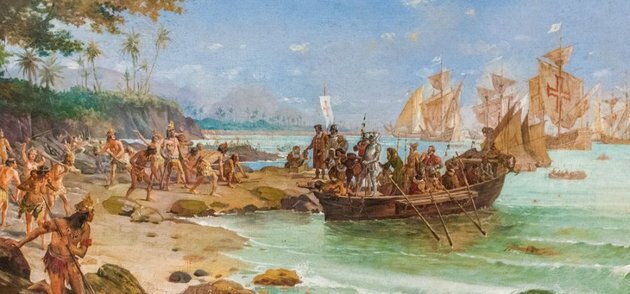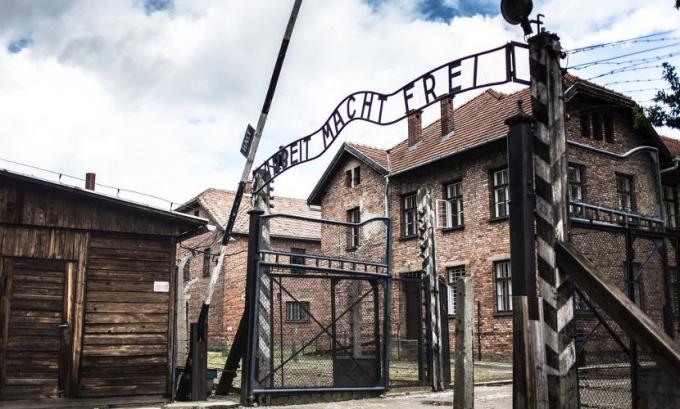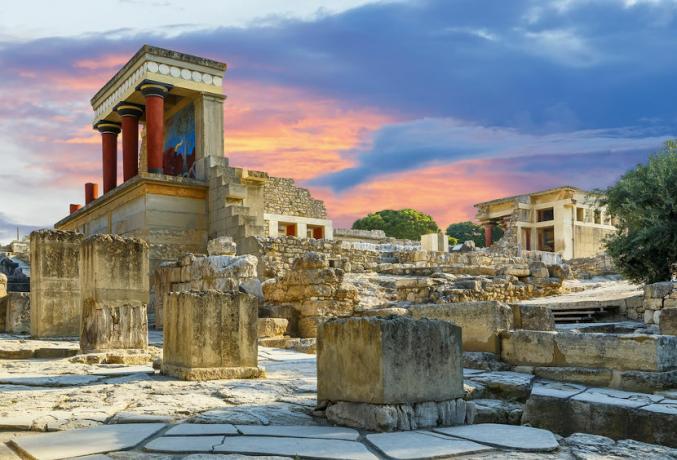O "Discovery of Brazil happened in April 22, 1500, when the Portuguese arrived in the lands that today belong to Brazil.
This event, which marked the history of our country, was the result of intellectual effort and several maritime expeditions carried out by Portuguese navigators.
The term “discovery” is increasingly being questioned by scholars for not accurately describing this historical fact. This is because "discovery" is a Eurocentric term, as it means that there are no inhabitants in the lands found by the Portuguese.
Thus, the expression "Arrival of the Portuguese in Brazil” would be more precise, as it recognizes the existence of indigenous peoples in these lands.
Summary of the discovery of Brazil
The “Discovery” of Brazil must, above all, be considered in the context of the Great Navigations and Maritime Discoveries, promoted in the 15th and 16th centuries, by the Castilians and the Portuguese.
At this time, Portugal and the Kingdom of Castile (which would form the future Spain) set out to sea in search of new lands and, mainly, precious metals. With this, we know that years before the Portuguese, navigators in the service of the crown of Castile would have already sighted lands in the south of America.
Who discovered Brazil?
The official history established the name of Pedro Alvares Cabral as the first to find the new lands.
These maritime expeditions were carried out with the greatest secrecy, as Portugal and Castile competed with each other to discover lands beyond Europe.
Thus, there were many navigators who sighted the lands of South America and thus, preceded the Pedro Alvares Cabral.
We can mention Vicente Yáñez Pinzón, Diego de Lepe, João Coelho da Porta da Cruz and Duarte Pacheco Pereira. The latter would have commanded a secret expedition in 1498 to confirm the existence of Brazilian lands.
The expedition to Brazil
The squadron that arrived in Brazil was quite numerous and composed of experienced navigators.
Its main objective was to reach the Indies to negotiate commercial treaties, after the successful trip made by Vasco da Gama in 1498. However, before heading to Asia, they should check the lands that existed to the west.
However, due to the hostilities of the local peoples, Vasco da Gama recommended the use of force to carry out the spice trade in the Indies; hence the greatness of the next squad.
On March 9, 1500, thirteen ships departed from Lisbon. They contained supplies for over eighteen months, and about fourteen hundred men. In command, was the nobleman Pedro Álvares Cabral, accompanied by scholars such as the navigator Duarte Pacheco Pereira.
So, on March 22, the navigators skirted the island of Cape Verde, from where they headed west, crossing the Atlantic Ocean.
For a long time, it was believed that these lands would have been discovered by chance. However, the experience of browsers reveals that they wouldn't get lost so easily. Likewise, according to the logbooks, no storms were recorded.
Arrival of the Portuguese in Brazil
The day of the arrival of the Portuguese in Brazil - which took place on April 22, 1500 - is celebrated as the Discovery Day of Brazil, April 22, and remember that historic date.
With no reports of any kind of difficulty or unforeseen events, Cabral's squadron crosses approximately 3,600 kilometers in a month, until they find the first signs of land.

Arriving on the south coast of the current state of Bahia, the Portuguese fleet's caravels sighted a hill, which was named Monte Pascoal. On that date, April 22, a small incursion by the fleet would land on the coast, a place that became known as Porto Seguro.
Immediately, Gaspar de Lemos, a veteran navigator and commander of the supply vessel, was ordered to return to Portugal. He would deliver the account of Pero Vaz de Caminha, the famous Letter, to King Dom Manuel I about the discovery of Brazil.
The meeting with the natives
Two days after their arrival, the Portuguese became acquainted with the indigenous people who inhabited the region. Cabral then embarked some indigenous people in his caravel.
The coast of Bahia was occupied by the Tupinambás and Tupiniquins Indians, while the Aimorés lived in the interior.
In the caravel, the Indians tried – and didn't like – the Portuguese food and were amazed by the animals, like the chickens.
According to Pero Vaz Caminha, when they saw objects made of silver and gold, the indigenous people implied that they knew them and pointed to the land. Thus, the Portuguese thought that they had those metals, which was not confirmed by their research.
The strangeness also came from the Portuguese, who did not understand the fact that the Indians were naked. Likewise, as they did not find statues representing gods, they concluded that the natives had no religion.
Origin of the name of Brazil
Later, on April 26, the first mass was celebrated on Brazilian soil, held by Friar Henrique de Coimbra.
After saying mass and renewing the squadron's supplies, Pedro Álvares Cabral headed for the Indies. As they believed that the discovered land was just an island, they named it Ilha de Vera Cruz, later it would be replaced by Terra de Santa Cruz, as navigators realized that it was a continent.

Finally, they decided to call it Brazil in 1511, due to the large number of pau-brasil trees in the region. Even so, some European authors referred to the new lands as "land of parrots", due to the large number of these birds found in the region.
Despite the finding and the report made to the king, the Portuguese Crown had other priorities. Therefore, in the beginning, no expedition was sent to occupy the lands found. The Portuguese only traded with the Indians in exchange for brazilwood.
The news of the wealth of the new lands also attracted the interest of the French, Dutch and English, with whom the Portuguese Crown had not signed any treaty like that of Tordesillas.
Therefore, from 1530 onwards, an expedition was organized by Martim Afonso de Souza, in order to appropriate the new lands.
Curiosities about the discovery of Brazil
- The "Discovery of Brazil" becomes a cultural reference from the 19th century onwards, when there was a concern with writing the history of Brazil.
- The rock band Legião Urbana named their sixth album with the name "O Descobrimento do Brasil" although no song mentions the historical fact.
We have more texts on the subject for you:
- The Great Navigations
- Brazil Discovery Day
- Arrival of the Portuguese in Brazil
- colonial Brazil exercises
If you are looking for a summary for early childhood education, see: Discovery of Brazil - Kids.


